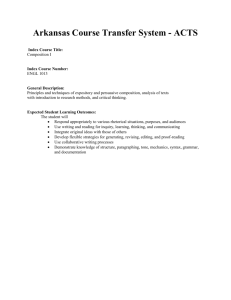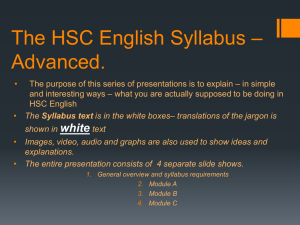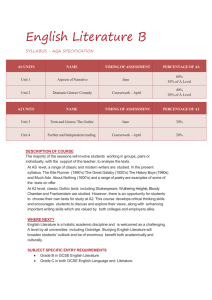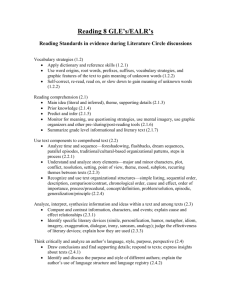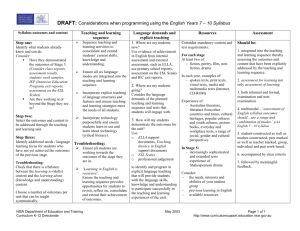Introduction to English Studies
advertisement
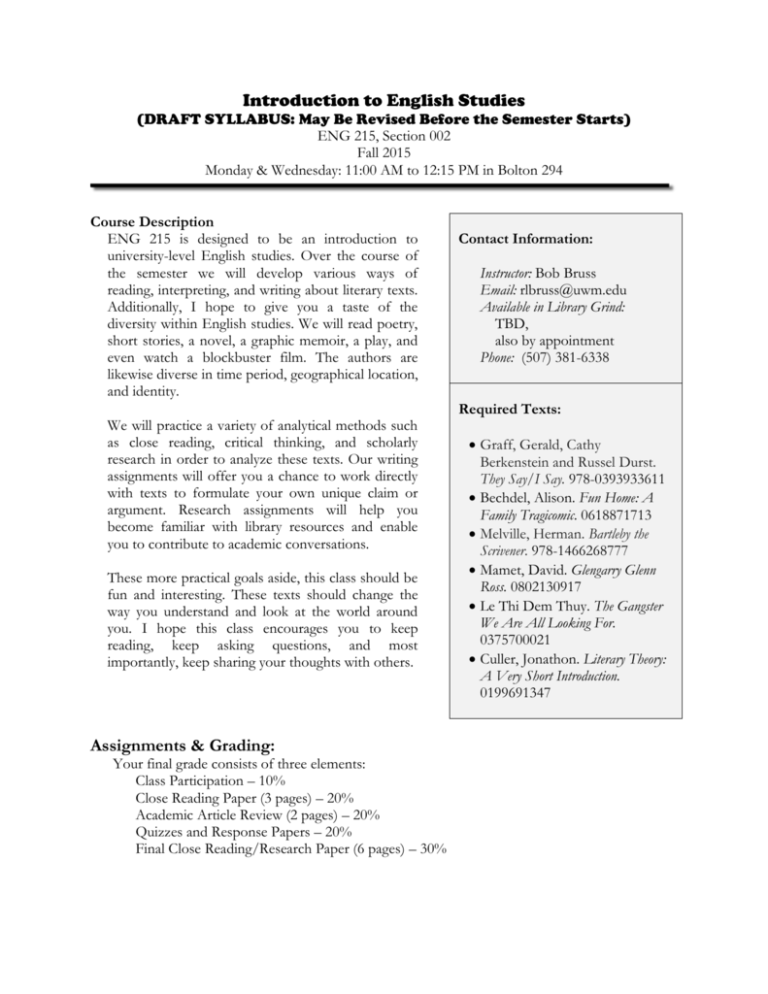
Introduction to English Studies (DRAFT SYLLABUS: May Be Revised Before the Semester Starts) ENG 215, Section 002 Fall 2015 Monday & Wednesday: 11:00 AM to 12:15 PM in Bolton 294 Course Description ENG 215 is designed to be an introduction to university-level English studies. Over the course of the semester we will develop various ways of reading, interpreting, and writing about literary texts. Additionally, I hope to give you a taste of the diversity within English studies. We will read poetry, short stories, a novel, a graphic memoir, a play, and even watch a blockbuster film. The authors are likewise diverse in time period, geographical location, and identity. We will practice a variety of analytical methods such as close reading, critical thinking, and scholarly research in order to analyze these texts. Our writing assignments will offer you a chance to work directly with texts to formulate your own unique claim or argument. Research assignments will help you become familiar with library resources and enable you to contribute to academic conversations. These more practical goals aside, this class should be fun and interesting. These texts should change the way you understand and look at the world around you. I hope this class encourages you to keep reading, keep asking questions, and most importantly, keep sharing your thoughts with others. Assignments & Grading: Your final grade consists of three elements: Class Participation – 10% Close Reading Paper (3 pages) – 20% Academic Article Review (2 pages) – 20% Quizzes and Response Papers – 20% Final Close Reading/Research Paper (6 pages) – 30% Contact Information: Instructor: Bob Bruss Email: rlbruss@uwm.edu Available in Library Grind: TBD, also by appointment Phone: (507) 381-6338 Required Texts: Graff, Gerald, Cathy Berkenstein and Russel Durst. They Say/I Say. 978-0393933611 Bechdel, Alison. Fun Home: A Family Tragicomic. 0618871713 Melville, Herman. Bartleby the Scrivener. 978-1466268777 Mamet, David. Glengarry Glenn Ross. 0802130917 Le Thi Dem Thuy. The Gangster We Are All Looking For. 0375700021 Culler, Jonathon. Literary Theory: A Very Short Introduction. 0199691347 ENGL 101-020 Syllabus Bruss 2 Participation: Class participation is a crucial element to this course. I want to encourage Asking questions, pointing out interesting or difficult passages, sharing your opinions, and responding to others are all ways to participate in this class. Close Reading Paper (3 pages): We will discuss what close reading is in class. These papers must fulfill this kind of practice and will be evaluated on how they do so in response to the texts. This type of reading and writing is a foundational skill in English studies, and proves to be challenging for many students. As a result, if you are unsatisfied with your grade on this assignment, you will have a week to rewrite it with the possibility of moving up one letter grade (e.g. C to B). Academic Article Review (2 pages): We will visit the library in order to be able to take advantage of the resources available for finding scholarly peer-reviewed articles in English studies. You will find an article based on a text or writer discussed in class. Your paper must summarize the article, make it clear that you understand the author’s argument, critique or add to the argument, and show how it adds to our understanding of the original text or writer in question. Grades will be based on the clarity of your summary and the strength of your critique. Quizzes and Response Papers: I will periodically give reading quizzes in class. The questions I ask should be relatively easy as long as you have done the assigned reading for that day. So just keep up with the reading and come to class and you should have nothing to worry about. I will also sometimes ask you to type up a short response paper based on our reading. All the quizzes and response papers together make up 20% of your grade. Missed quizzes or late response papers cannot be made up. Final Close Reading/Research Paper (6 pages): Your final paper will be a sustained close reading of one of our primary course texts. Your reading must also utilize other source material (e.g. academic articles) that relates to the text you have chosen. I will discuss this assignment in more detail later in the semester, but over the course of the semester think about what interests you and what you might want to write your final paper about. I encourage you to come talk to me about your ideas before you start writing. Course Policies 1. Attendance: Students are allowed four absences for any reason without penalty. Missing a significant portion of a class will also count as an absence. Every absence after the fourth will result in a full letter grade deduction from your final course grade. 2. Deadlines: All assignments are required to be completed in order to pass this course. Assignments must be turned in on D2L before class on the day they are due, even if you are absent that day. Late assignments will receive a letter grade deduction for each day it is late. After a week, late assignments will not be accepted, and you will be unable to pass this course. Be sure to contact me about any extenuating circumstances well before a deadline, so that we can make alternative arrangements if necessary. 3. Academic Honesty/Plagiarism: Students will be held to the highest standards of honesty. Presenting someone else’s work as your own is always unethical and, at times, illegal; conversely, allowing someone else to use your work is also academically dishonest. Any time you include outside ENGL 101-020 Syllabus Bruss 3 material in your work, you must also include a citation to let readers know this is the case. The university takes plagiarism very seriously. Willful plagiarism may result in failure of the course, suspension, or even expulsion from the university. 4. Accommodations: If you have a chronic health condition or disability that may affect your ability to meet any of the requirements of this course, you must bring me a VISA form completed by a counselor from the Accessibility Resource Center within the first two weeks of class. Together with the ARC, we can then establish a plan that enables you to meet the goals of the course. 5. Technology: Cell Phones - Receiving or sending communications via cell phone – of any kind – is distracting and disrespectful to your instructor and your fellow students. Please silence your cell phones and keep them stowed for the duration of class. If you have a unique situation wherein you need to be contacted during class for a serious reason, please notify me at the beginning of class; I will allow you to step outside to take your call. Computers - I recognize some students may find it advantageous to take notes on their computers during class. Still, we are all aware computers can be distracting during class; thus, you take responsibility for remaining attentive and not distracting others if you choose to use one. It is up to my discretion to determine if you are adequately participating, as well as determining appropriate usage. I reserve both the right to look over your shoulder during class and to require you to stow your computer if necessary. Assistance/Concerns: 1. Instructor: If you have questions, comments, concerns, etc., please do not hesitate to contact me. My primary mode of communication is e-mail (rlbruss@uwm.edu). I check it every day and you can usually expect a reply within 24 hours (often much less). Otherwise, feel free to stop by during my available hours or schedule an appointment. Finally, you can call or text my personal phone number: (507) 381-6338. This can be helpful for last minute concerns, or if you’re just more comfortable with this mode of communication. Please do not call late at night or early in the morning. And I reserve the right to post any embarrassing texts or voicemails online . 2. Writing Center: This is a wonderful resource that provides one-on-one dialogue about your writing. Do not just think of them as a fix-it shop. They can help at any stage of the process, at any skill level, and for any course. To make an appointment, visit www.writingcenter.uwm.edu, call (414) 229-4339, or visit Curtin 127 or the Library East Wing. 3. Student Accessibility Center: The SAC can provide assistance and guidance for students struggling with chronic illness or any disabilities that create additional academic challenges. These include, but are not limited to, sensory impairments, limited mobility, ADHD, dyslexia, chronic depression, and cognitive disabilities. If you feel as though you may benefit from their services, contact them at Mellencamp 274 or (414) 229-3800 4. Norris Health Center: At times physical concerns such as illness or injury, or personal concerns including stress, depression, anxiety, substance abuse, etc., could negatively affect your academic performance. In these instances, I encourage you to take advantage of the medical and counseling services provided on campus. The Norris Health Center is located between Enderis Hall and the Klotsche Center, and can be reached at (414) 229-4716. ENGL 101-020 Syllabus Bruss 4 ENGLISH 215 COURSE GOALS 1. English studies in the 21st century is a global enterprise; it is not necessarily limited by boundaries of class, ethnicity, nationality, or other demarcations of difference. Instead, English studies recognizes difference as the catalyst of creativity in the life of English (or “Englishes”) around the world. Through selected texts from the U.S. and other countries, English 215 should familiarize students with the many ways in which English has become an essential means of communication and expression in the arts, politics, popular culture, technology, and other forms of public discourse. Across borders of many kinds (geographic, historical, sociocultural), students should be encouraged to investigate the ways in which English has and continues to reinforce, reframe, or resist, prevailing values and systems of belief. Through course readings, assignments, and discussions, students should acquire a deeper understanding and broader knowledge of English as a multicultural phenomenon, which links readers and writers from many different backgrounds in their efforts to make sense of the world. 2. English studies has grown to include a wide range of artistic, persuasive, and popular forms of communication and expression. Essays, poems, short stories, plays, and novels belong in the realm of English studies; so do films, television shows, online articles, performance art, and other signs of the endless potential of English to speak creatively in many voices for many purposes. Texts and materials for English 215 should reflect the diversity of forms that English studies takes as its field of inquiry as well as the critical vocabularies and concepts responsive to that diversity of creative forms. 3. Through reading and writing, students should have the opportunity to engage in activities of interpretation and writing that emphasize the dynamic interrelationship of writer, reader, text, and context in giving life and meaning to the written word. Texts for English 215 should invite discussion of the historical, cultural, material, and institutional contexts that have shaped, reshaped, and continue to shape the significance of English and English language art forms. Through extensive practice in responding to these texts and performances, students should enhance their analytical and rhetorical skills; they should gain confidence in their own ability to write with persuasive power. 4. The continuing evolution of the English language itself, in its many variations across contexts and cultures, is a richly creative process of invention, adaptation, transformation, and expansion. Students should be encouraged to explore and participate in this process through their course work. Rather than approach the study of English as the categorization of texts by form and function, students should be given the opportunity to “break open” texts and discover how they work, i.e., how they represent, reconstruct, and re-imagine the world. Moreover, students should learn to appreciate their own roles and responsibilities as writers, readers, and world citizens whose use of language contributes to its vitality. ENGL 101-020 Syllabus Bruss 5 GER Humanities Syllabus Language Department of English General Education Requirement This course meets the criteria for General Education Requirement Humanities credit at UWM by addressing “questions, issues and concepts basic to the formation of character and the establishment of values in a human context; … induc[ing] an organic study of letters and knowledge; [and providing] literary, aesthetic and intellectual experiences which enrich and enlighten human life,” as specified in UWM Faculty Document No. 1382. The course uses humanistic means of inquiry, including critical use of sources and evaluation of evidence, judgment and expression of ideas, and organizing, analyzing and using creatively substantial bodies of knowledge drawn from both primary and secondary sources. In addition to addressing other GER Humanities criteria, the course introduces substantial and coherent bodies of historical, cultural and literary knowledge to illuminate human events in their complexities and varieties, and enhances appreciation of literary and other arts by thoughtful, systematic analyses of language and artifacts such as novels, stories and films. UWM seeks Essential Learning Outcomes throughout the undergraduate curriculum in four key areas: Knowledge of Human Cultures and the Physical and Natural World; Intellectual and Practical Skills; Personal and Social Responsibility; and Integrative Learning. GER courses in particular contribute to these learning outcomes. Student work in GER courses is assessed individually for course-specific outcomes and goals, and holistically as part of departmental self-assessment of learning outcomes throughout the major. Grading and Assessment In English 215, students will demonstrate learning outcomes in “Knowledge of Human Cultures” and in “Intellectual and Practical Skills”: by engagement with key questions in literary and other cultural artifacts, and by producing written literary or cultural analysis that reflects thoughtful, informed engagement with source material and standards of evidence and argumentation in humanistic disciplines. This outcome will be assessed through review of papers written in the course, a requirement of all English GER courses, via the rubric which appears on the following page. ENGL 101-020 Syllabus A B C D F Bruss 6 Content Organization Mechanics & Editing Other Highly original. Clear thesis and argument. No factual or logical inaccuracies. Well-organized, even at paragraph level. Accurate use of citation conventions. Precise word choices; vivid, fresh language. Avoids wordiness. Informal language only when clearly appropriate. Establishes ethos strongly through knowledge of subject. Minimal summary; uses evidence, not opinion; represents secondary sources accurately. Less original; may have minor factual errors. May use secondary sources uncritically or with mild inaccuracy. Relies more on summary than original interpretation or argument. Restates common or familiar arguments or interpretations uncritically. Secondary sources do not clearly contribute to or support the argument, or may be presented inaccurately. No original contribution; restatement or misstatement of the ideas of others. Doesn’t interpret, but just repeats or reports. Lacks clear thesis or point. Reader led through a logical sequence; paper stays on topic. Well-organized, but structure sometimes disjointed. Goes off-topic on occasion. Basically well organized, though individual paragraphs may be disunified or misplaced. Virtually no mechanical or formatting errors. Some awkwardly worded passages. Some errors, but not enough to distract the reader. More frequent awkwardness, with distracting errors, although meaning is clear. Entertains, educates, and makes reader want to know more. Language sometime too general or less precise than the A writing. Enough errors to suggest the paper needs more polish and thought. Language is competent but wordy, general, imprecise, or trite. Logical and apparent plan overall. Citations improperly formatted or absent. Poor organization; reader has little sense of a plan even though a thesis or main point is recognizable. Some sentences may be so confused that their meaning does not clearly emerge. Words may be imprecise, incorrect, trite, or vague. In general, however, the paper is understandable. Language muddled and unclear in several spots. Highly distracting mechanical errors. Shows little care or attention to detail on the part of the author. GER Course Assessment All GER courses in the Department require significant student writing, including papers of varying length. The Department samples GER courses in each semester, including primarily papers from the required ENG 215 course, evaluating them on a holistic scale, according to the following rubric: 1. Work does not meet disciplinary standards for critical analysis, evidence-based argument, and interpretation of literary or cultural artifacts. Work does not meet expectations for clarity of thought and language, and for edited academic prose. ENGL 101-020 Syllabus 2. 3. 4. 5. Bruss 7 Work does not show student awareness of conventions for analysis and expression. [Work quality falls between 1 and 3] Work shows some awareness of conventions for analysis and expression but may contain distracting errors. Work meets some disciplinary standards for critical analysis, evidence-based argument, and interpretation of literary or cultural artifacts, but inconsistent in doing so. Work meets some expectations for clarity of thought and language, and for edited academic prose, but is inconsistent in doing so. [Work quality falls between 3 and 5] Work meets most or all expectations for analysis and interpretation, argues from evidence, and is written clearly and without significant mechanical errors, showing student awareness and achievement the learning outcomes for the course. Numeric scores are used to generate snapshots of how well GER courses meet the department’s stated learning outcomes and what, if anything, needs to be altered when the course is next offered. ENGL 101-020 Syllabus Bruss 8 Tentative Course Calendar * The following calendar is subject to change, but if any changes are made, you will be provided with a newly revised calendar. Week 1 Wed 9/3: Introduction and Syllabus Mon 9/8: What is “literature”? Read: Culler – Chapter 2 “What is Literature and Does It Matter” from Literary Theory: A Very Short Introduction; They Say/I Say Preface, Introduction, and Chapter 11; Updike – “A&P” Week 2 Wed 9/10: Finding the “Unfamiliar” Read: Shklovsky – “Art as Technique”; Dickinson – “I heard a Fly buzz–when I died”; Donne – “Batter my heart, three-personed God; for you”; Soto “Oranges” Mon 9/15: Form and Content Read: Brooks – “The Formalist Critics”; Herrick – “Delight in Disorder”; Cummings “l(a”; Stevens – “The Emperor of Ice Cream” Week 3 Wed 9/17: Thinking about Art Read: Gallop – “Close Encounters: The Ethics of Close Reading”; Keats – “Ode on a Grecian Urn”; Cortázar – “The Continuity of Parks”; Heaney “Digging” Write: Short response paper - close reading DUE Mon 9/22: Finding “Meaning” Read: Culler – Chapter 4 “Language, Meaning, and Interpretation”; Morrison – “Recitatif” Week 4 Wed 9/24: Interpreting through “Bartleby’s” Text Read: Melville – Bartleby the Scrivener Mon 9/29: Interpreting through “Bartleby’s” Context Write: Close Reading Paper DUE Week 5 Wed 10/1: Contexts: War Read: Whitman – “Beat! Beat! Drums!”; O’Brien “How to Tell a True War Story” Th 10/6: Contexts: Politics/Dystopia Read: Vonnegut – “Harrison Bergeron”; Auden – “The Unknown Citizen”; Orwell – excerpt from “1984” Week 6 Tu 10/8: Library Orientation Read: TS/IS Part 1 ENGL 101-020 Syllabus Bruss 9 Th 10/13: Contexts: Harlem Renaissance Read: Culler – Chapter 8 “Identity, Identification, and the Subject”; Hughes – “Mother to Son” & “I, Too”; Cullen – “Yet Do I Marvel”; Hurston “How It Feels to Be Colored Me” Week 7 Tu 10/15: Contexts: Feminisms Read: Gilman – “The Yellow Wallpaper”; Schreiner – “The Buddhist Priest’s Wife”; Glaspell – “A Jury of Her Peers” Th 10/20: Graphic Novel, Memoir, and Identity Read: Bechdel – Fun Home pp. 1-54 Week 8 Tu 10/22: Fun Home cont. Read: Bechdel – pp. 55-102 Write: Academic Article Review DUE Th 10/27: Fun Home cont. Read: Bechdel – pp. 103-150 Week 9 Tu 10/29: Fun Home cont. Read: Bechdel – pp. 151-186; TS/IS Chapters 4 & 5 Th 11/3: Fun Home cont. Read: Bechdel – pp. 187-232 Week 10 Th 11/5: Drama and Masculinity Read: Mamet – Glengarry Glen Ross pp. 10-52 Tu 11/10: Glengarry cont. Read: Mamet – pp. 53-108 Week 11 Th 11/12: Sharing plans for final paper Read: TS/IS Chapters 6-10 Write: Response paper – final paper proposal DUE Tu 11/17: The Gangster We Are All Looking For Read: Thuy – The Gangster We Are All Looking For pp. 3-35 Week 12 Th 11/19: Gangster cont. Read: Thuy – pp. 36-78 Tu 11/24: Gangster cont. Read: Thuy – pp. 79-124 Week 13 Th 11/26: NO CLASS – Thanksgiving Break ENGL 101-020 Syllabus Tu 12/1: Gangster cont. Read: Thuy – pp. 125-160 Week 14 Th 12/3: Final Paper Workshop Write: Full Draft of Final Paper DUE Tu 12/8: Application to Pop Culture Watch: The Dark Knight Week 15 Th 12/10: Final Thoughts Write: Final Paper DUE!!!! Bruss 10

